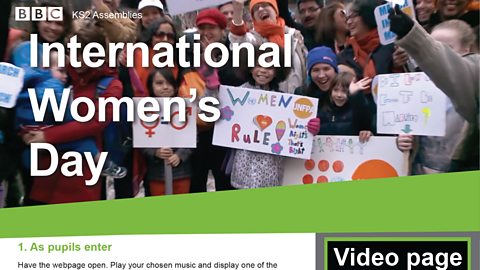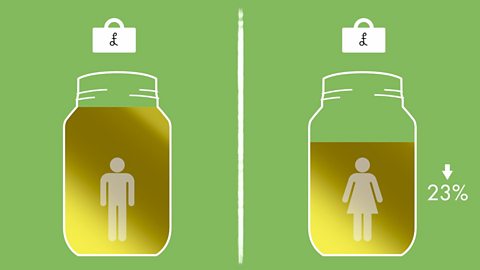In short...
Themes: Celebrating International Women's Day, Equality, Fairness
Summary: This assembly celebrates International Women's Day. It addresses issues of inequality - both in the UK and around the world - and stresses the need for equality while celebrating women's achievements.
Resources: The and an illustrating that, on average, women are paid 23% less than men.

The video
Every year on the 8th March, people all over the world come together to celebrate International Women’s Day.
On this day there are speeches, social media campaigns, demonstrations and marches.
“Marching on the street continues to be important. It’s how they demonstrated one hundred years ago, it’s how we still come out in numbers, to make a difference.”
International Women’s Day started over one hundred years ago, in 1911…at a time when women everywhere had very few rights.
Many considered them to be not as capable as men! Now, of course, we know that's not true, but back in 1911, women weren't even allowed to vote.
Since then, women have fought hard for the freedom and rights they have today.
“What do we want? Equality! When do we want it? Now!”
But sadly, society is still a long way from achieving gender equality.
Gender equality means that everyone; women and men, and girls and boys are treated fairly, and enjoy the same rights, access to resources, opportunities, and protections.
Yet, women and girls are treated unfairly in many ways all around the world today.
In some cultures, many women live without basic freedoms and rights – like being able to travel alone, or go to school.
According to a United Nations report only 66% of countries worldwide provide equal education opportunities to both girls and boys.
And statistics from the UN show that despite making up 50% of the global population, women hold less than 30% of top jobs in government or senior management positions in business.
And are paid an average of 23% less than men - Sometimes for doing the same job!
And that’s not all…
In some parts of the world women don’t have the right to own their own land…
or sign legal contracts…
or even travel in the same way as men.
And many women and girls are also prevented or discouraged from being the people they want to be, or doing the things they want to do, because of unfair perceptions about their abilities.
Some people think girls can’t do certain jobs.
Or play sports.
Or even drive properly!
But the truth is, girls can do everything that boys can do.
International Women’s Day is an opportunity to show just how powerful women can be. And to celebrate their achievements.
And it’s also an opportunity for women and men around the world to highlight the issues still facing women today, and push towards a more fair and gender equal world in the future.
“International Women's Day is important to me because it shows the women I look up to in a positive light”
“I think it is important that at least on one day of the year, I want it to be everyday, but at least one day of the year, we reflect all the achievements that we have already made in order to get women equal in our society”
“I hope that in the future, it becomes just the norm, and we don’t need to necessarily have days but it’s an amazing day and it’s something that is really important to society.”
“Well, I still think there is so much to be done, y’know we can’t sit on our backside and say that we have got progress and we have got equality and diversity and all the rest of it. We haven’t. There is still so much we can do, and it’s the activism of individual people that can make a difference”
The video is about International Women's Day.
International Women's Day (IWD) is celebrated around the world each year on 8 March, with many people taking part in speeches, social media campaigns, demonstrations and marches. IWD started in 1911, at a time when women had very few rights with women in the UK not gaining the right to vote until 1928. The video features interviews with Helen Pankhurst, activist and Great-Granddaughter of Emmeline Pankhurst, one of the leaders of the suffragette movement.
Today, women are still treated unfairly in many different ways. According to a from 2020, only 66% of countries worldwide provide equal education opportunities to both girls and boys. Statistics from a show that despite making up 50% of the global population, women hold less than 30% of top jobs in government or senior management positions in business.
The video concludes with positive viewpoints, showing that IWD is an opportunity to show just how powerful women can be. And to celebrate their achievements.
Duration: 3' 59"
Final words: '…it's the activism of individual people that can make a difference.'
Video questions
- Can you remember what sort of activities happen on International Women’s Day? (Speeches, campaigns, demonstrations and marches. Broadly looking for an awareness that International Women’s Day is about raising awareness of gender inequality).
- Who can describe what gender equality is? (Men and women are treated fairly and enjoy the same rights, access to resources, opportunities and protections). Wait for responses. Follow up with Do you think it is fair for people to be treated differently because of their gender? (No, it isn’t fair).
- Can you remember some of the ways that women are treated differently to men around the world today? (Unable to travel alone, go to school, fewer in top jobs, paid less, can’t own land, sign contracts, prevented or discouraged from following their dreams. Looking for an awareness that gender inequality can be found all over the world, and in many different aspects of life).
- Can anyone tell me what the main message of International Women’s Day is? (That everybody deserves to be treated equally, regardless of their gender). Wait for responses. Follow up with Do you think the Women’s Day campaign wants women to be treated better than men? (No. Looking for awareness that they just want equality).

Key links
Download / print the assembly framework ready for use

Click to display the image full-size


1. Entry
Play your chosen music.
2. Introduction
Tell the children that they will be learning about International Women’s Day and the ongoing issues of gender equality. Explain to the group that men and women are often treated differently all around the world, known as gender inequality. While they watch the video, ask them to think about how International Women’s Day helps to highlight and reduce gender inequality.
3. The video
Play the video. The duration is 3' 59" and the final words are: '…the activism of individual people that can make a difference.'
4. After the video - Time to talk
- Ask the children 'Please turn to the person next to you and tell them a time when you saw someone treating boys and girls differently, or experienced gender inequality yourself.’
- Then lead a discussion about the video to help children consolidate their understanding of International Women's Day and its significance:
- Can you remember what sort of activities happen on International Women’s Day (Speeches, campaigns, demonstrations and marches. Broadly looking for an awareness that International Women’s Day is about raising awareness of gender inequality).
- Who can describe what gender equality is? (Men and women are treated fairly and enjoy the same rights, access to resources, opportunities and protections). Wait for responses. Follow up with: Do you think it is fair for people to be treated differently because of their gender? (No, it isn’t fair).
- Can you remember some of the ways that women are treated differently to men around the world today? (Unable to travel alone, go to school, fewer in top jobs, paid less, can’t own land, sign contracts, prevented or discouraged from following their dreams. Looking for an awareness that gender inequality can be found all over the world, and in many different aspects of life).
- Can anyone tell me what the main message of International Women’s Day is? (That everybody deserves to be treated equally, regardless of their gender). Wait for responses. Follow up with Do you think the Women’s Day campaign wants women to be treated better than men? (No. Looking for awareness that they just want equality).
5. Opportunity to sing
An opportunity to sing your chosen song. Suggestions from ≥…»ÀøÏ ÷ collections below.
6. Opportunity for reflection
Focus your reflection on the gender inequality that is part of our society today. Ask the children to sit quietly and think about how they feel if they are treated differently to others. Everyone is unique, and our gender makes up just part of who we are. It doesn’t make us more or less capable of doing anything, and we shouldn’t be treated differently because of it. Every person deserves the right to be treated equally. On International Women’s Day we remember that, but every day we can all play our part to help end gender inequality for good.
7. Opportunity for prayer
Begin with your usual form of address ('Dear God', 'Let us pray', etc) and:
We thank you for those people who are working to make our society fair and equal.
Help us all to act when we see things that are unfair.
Help us to treat everyone with the same respect, regardless of their gender.
Amen.

Suggested songs
'Together' - All about our school, no 13 (¬© Dave Corbett / ≥…»ÀøÏ ÷)

